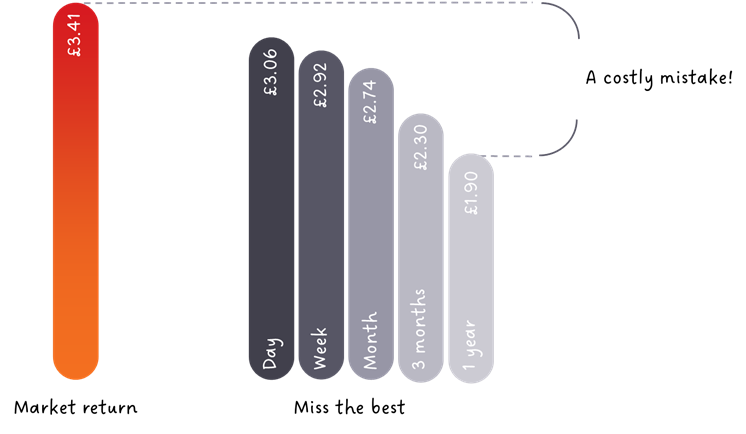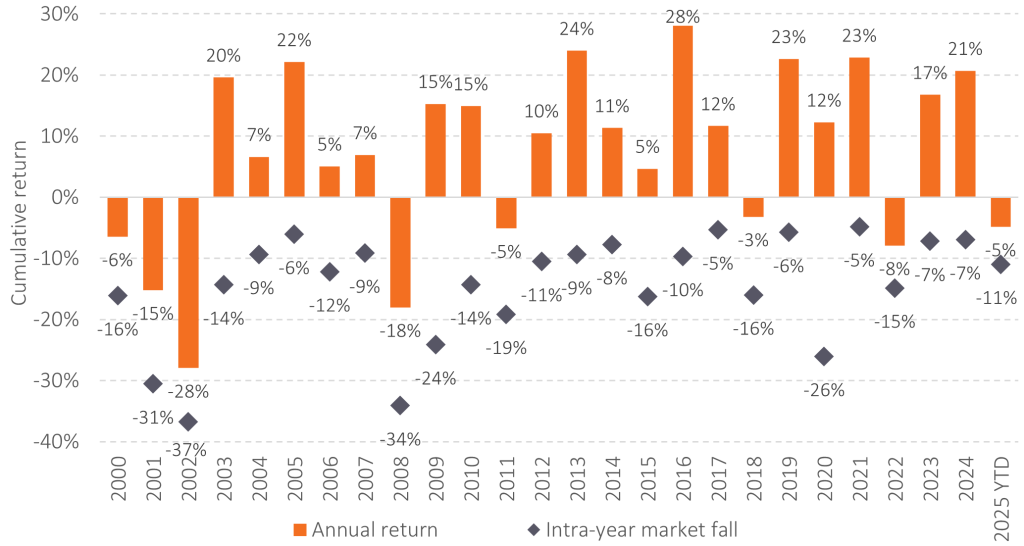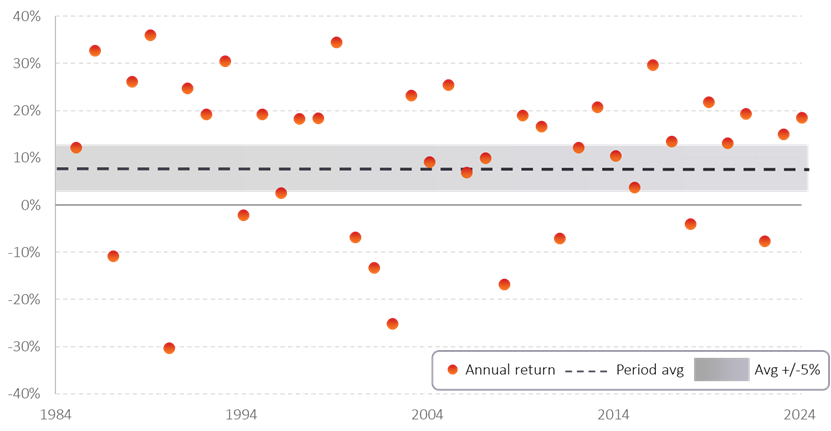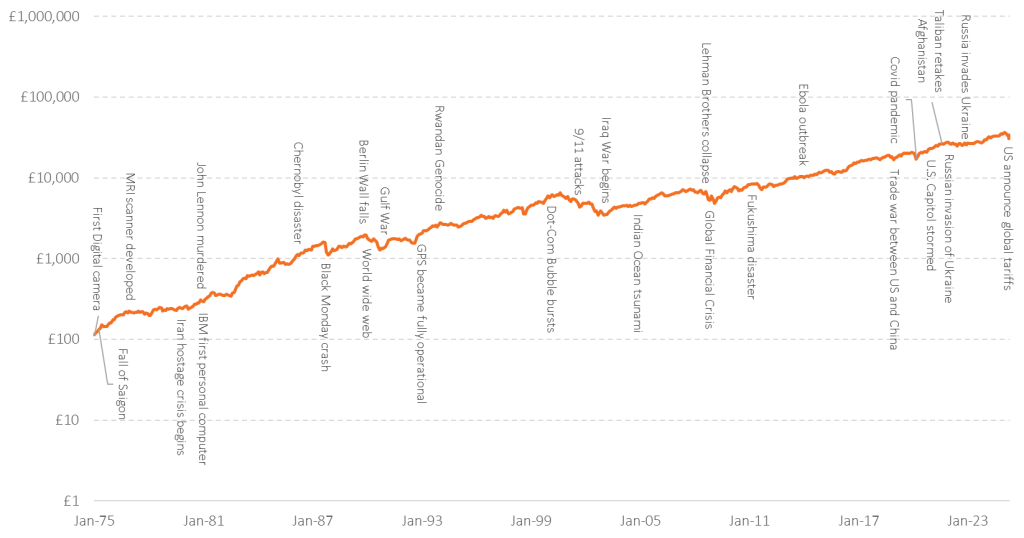Staying calm in turbulent markets
The media has been full of speculation on the tariff policies of President Trump for some time. News headlines referring to the equivalent of an economic war breaking out and threats of a global recession are designed to capture attention rather than to calm nervous investors.
Periods of volatile markets can inevitably feel unsettling and it’s so important for investors to remain calm and rational despite all the short-term uncertainty.

10th April 2025
-
Gavin Jones See profile
Understanding that new information gets priced into stock markets quicker than most investors can react, means that most would do well to accept the current stock price as fair. Remember that share prices are the consensus view of all market participants. While the world is always uncertain, as we all wait for the next announcement regarding tariffs, there could be large swings in value. And as we have seen, these moves can also be sharply upwards after Wednesday night’s announcement that the Tariffs were being paused for negotiation, other than for China.
We will have covered the possibility of stock market falls at length with you through our risk discussions and to help manage risk, we will have allocated part of your funds to defensive assets depending on your individual circumstances and thoughts around risk and return. There are no easy answers – patience and fortitude are required.
At times like these, it is important for investors to remind themselves of some principles to avoid the risk of making decisions that could lead to poor – perhaps disastrous – outcomes. This short note also presents some powerful graphics which can hopefully bring comfort to long-term investors.
Investors face a temptation to ‘wait out the storm’. However, research[1] suggests that very few investors, whether professional or otherwise, possess any ability to successfully time when to be in or out of markets. The risk of trying to do so can be extremely costly, as the graphic below demonstrates.
Figure 1: Market timing can be costly

Source: Albion Strategic Consulting. Albion World Equity Index (https://smartersuccess.net/indices). Jul-07 to Dec-24. Daily returns in USD.
Looking at the 17 years since the great financial crisis of 2007 to 2009 if you had invested £1 into global stock markets it would have grown to £3.41 by the end of 2024. But missing the best month of performance, perhaps by selling out for a short period, would have reduced that return to £2.74. Missing the best year may have reduced your return to £1.90.
[1] E.g. Dai, Wei and Dong, Audrey, Another Look at Timing the Equity Premiums (October 11, 2023). Available at SSRN: https://ssrn.com/abstract=4586684 or http://dx.doi.org/10.2139/ssrn.4586684
The stock market falls from a high at some point every year. Current levels of global stock market falls are commonplace. This does not make it easy to remain invested through such bumps in the road, but it is vital to do so. Where markets go from here; nobody truly knows. The release of new information– which is, by definition, random – and how it is processed by investors will determine this.
Figure 2: Every year, the market falls – global

Source: Albion Strategic Consulting. Data: Vanguard Glb Stk Idx $ Acc
The chart shows the annual return of global stocks each year, illustrated by the orange bar. In each year there will be falls from the peak of the market and the black diamond shows the biggest fall for the year. As an example, you can see during 2020, the fall from the peak was 26% as the world locked down before recovering and the year finished with global stocks up 12%.
Volatility – a statistical measure representing the bumpiness of the ride – is always inherent in markets. Assumptions of investing returns incorporate an expectation of interim volatility. Significant and protracted stock market declines from time to time are expected as a feature of markets. This is understood when making the appropriate decision in our investment recommendations to you.
Figure 3: Market returns vary widely around the average
Source: Albion Strategic Consulting. Albion World Stock Market Index. 1985-2024. Returns in USD.
The chart above shows that, for stock market investment, the average return over the last 40 years has been almost 10%. In any given year, this ‘average’ has meant growth of almost 40% in some years and falls of 30% in others. Falls in the value of investments can be curtailed, but not avoided completely, through owning exposure to companies around the world (diversification) and an appropriate amount in high quality bonds.
World events that have had significant consequences have happened throughout history. During times like these – at least from a market perspective – it can help to look at the past to ease our concerns. The past may not, of course, repeat itself but markets have been remarkably resilient, as you can see from the chart below. Over the last 50 years, we have had health events, great strides in technology and wars and yet the path of stock market values has been strongly up.

Data: Albion World Stock Market Index
In the last week, we have all experienced the fear of falling markets and at the time of writing the hope is that calm heads will prevail as the higher level of tariffs are paused for 90 days. As hard as it can be, we need to remember to keep our emotions in check, believe in the robustness of our portfolios and continue on the investment journey with a long-term view.
If you need financial advice on wealth management or investment management, contact us today to speak to our expert teams.

